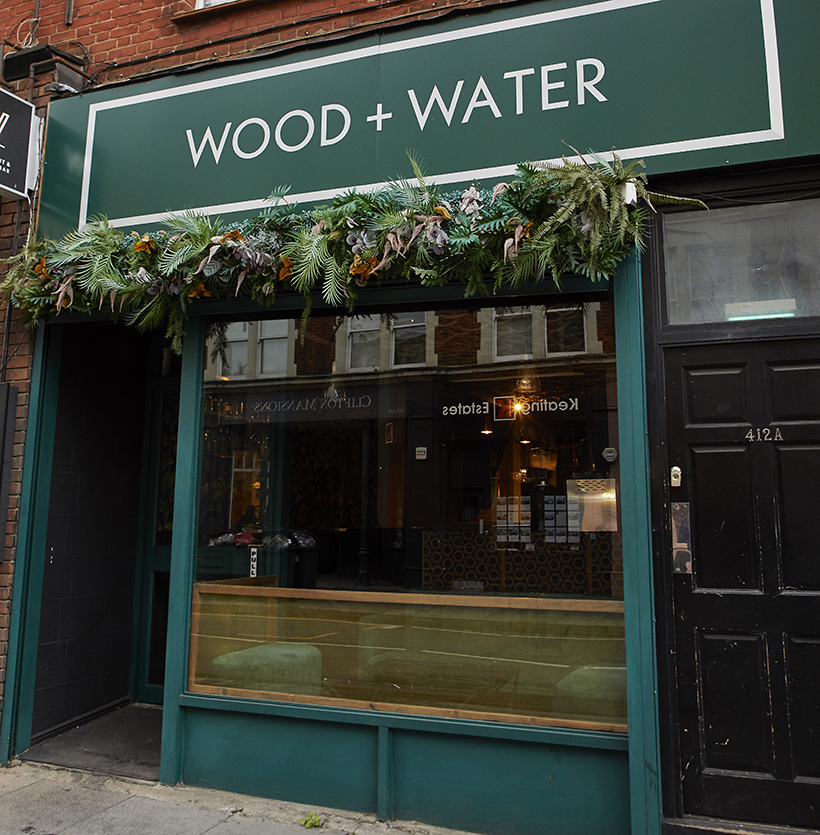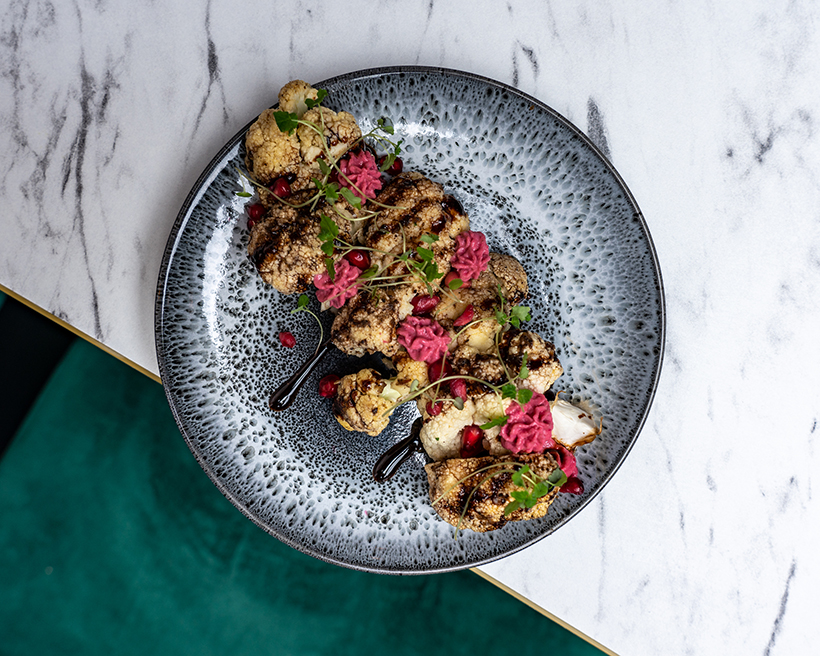Although April Jackson's Three Little Birds was doing well on paper, she has started from scratch with Wood & Water to try and shake up the Jamaican food scene
"Time will tell if it was brave or dumb," laughs April Jackson, talking about her decision to take her well-known, well-loved restaurant Three Little Birds and start again from scratch with a new name, new look and new concept during the pandemic.
Before opening her first restaurant, Jackson had no experience working in hospitality. A former Miss Jamaica Universe and contestant on series 11 of The Apprentice, the closest she came was running an event management company in Jamaica. But in 2015, she opened Three Little Birds in London.
After six years and despite having become a Brixton institution that she proudly describes straddling "a little bit of new and old Brixton", it was time to make a change.
"On paper Three Little Birds was doing really well," she explains, "[but] the mission was to really change the perception of Jamaican culture through hospitality, and I didn't feel like we were doing that anymore. You want people to understand the journey you're trying to take them on.
"We were too close to your Rum Kitchens and your Turtle Bays… we needed to create our own lane."
Fresh start
While many restaurants pivoted to takeaway over the last two years, for Jackson that wasn't an option. She references the development of Indian cuisine in the UK, which now has options ranging from casual takeaways to fine dining establishments and expresses the wish that Jamaican cuisine in the UK will achieve the same breadth of offering.
Instead, Jackson invested around £70,000 – approximately the same amount she had invested in setting up Three Little Birds in the first place – to strip the restaurant down and start again.
"It would be harder to explain the change to your customer if everything looked the same and we still had the same name," she says.
And so, the restaurant was relaunched almost a year ago, in November 2021 as Wood & Water. The light woods, bamboo and mix-and-match cutlery have been replaced with a black bar, marble-style tables and dark greens with touches of gold – subtle and stylish nods to the colours of Jamaica's flag.
The previously 45-cover restaurant has now been split into a 26-cover dining space and an 18-seat bar at the front, while the Jamaican tapas menu has been swapped for a modern British menu using local ingredients fused with Jamaican flavours. The only thing that has been retained is a rope feature on the ceiling, which Jackson and her father wove themselves.
As a result, the average spend per head has increased from £35-£40 to £55-£60. Jackson says the restaurant is selling more wine than it did in its previous incarnation, and the customer base has changed, although they have managed to hold on to what she estimates is about 20% of former customers. She says this change reflects the changing demographic of Brixton, with more customers from the creative arts and media sectors.
"We knew that was going to happen because [Brixton] is so different," she says. "For better or for worse, some people are very anti-gentrification, some are very pro-gentrification – the fact is, it's happening."
Warm up
Three Little Birds hasn't disappeared and now serves as the branding for the catering arm of the business, which Jackson says naturally lends itself to more casual fare – barbecue chicken, macaroni and cheese, and some of the staples from the Three Little Birds menu. The service style also hasn't changed, which has often been praised in reviews for its warmth.
"For me, hospitality in this city, even at its most efficient, is still very much, ‘you're the customer, I'm the waiter/waitress and there's a huge separation between us', which – coming from the Caribbean – can feel quite cold. [Jamaica's] a very tactile country. I encourage people to be more personal than you would find elsewhere, and I do think that has differentiated us," comments Jackson.
"My favourite author is Maya Angelou. She has a beautiful quote that says, ‘people will forget what you said, people will forget what you did, but people will never forget how you made them feel'. That for me completely sums up what hospitality should be."
This flatter hierarchy extends to her approach as an owner, which she says has earned her the respect of her team and makes her an attractive employer to potential recruits. The venue has also dropped from opening seven days a week including lunch, to five days a week and lunch only on weekends, to ensure the team have a better work-life balance. Despite this, the business hasn't been immune to the impact of industry-wide staffing shortages, and Three Little Birds' sister site in Clapham was forced to close last year due to a lack of staff.
Interestingly, Jackson's restaurant doesn't have a head chef, with the kitchen team made up of two chefs ("probably what you would call a chef de partie") and a kitchen porter, while Jackson writes the menus herself. She says she often finds herself hiring loyalty over experience or accolades.
"There are obviously advantages and disadvantages. You don't have to deal with egos," she points out. "The reality is that we are a true independent business. There isn't a secret partner or investor with a pot of gold. The way that salaries are just out of this world right now, I couldn't compete with most in terms of what a head chef would probably demand as a salary unfortunately, and I'm not about to run my business into the red for the sake of being able to announce that so-and-so is your head chef."
Meanwhile, the restaurant is also being hit by rising costs, which will be factored into the new menu coming in for the colder months: "The price of five litres of olive pomace oil has gone from £7.99 to £18.99. Obviously, everybody has to constantly review their pricing but you're trying not to scare people at a time when people are considering their spend and perhaps not eating out as much," says Jackson. "You can't pass all of the increases to your customer, you have to strike a balance where you're not just digging yourself into a hole."
Raise the bar
Despite her enthusiasm for the relaunched restaurant and having long spoken of hopes to expand the business to a small group of six or so sites, Jackson's ambitions have shifted and tempered in 2022's economic climate.
"I have zero interest in opening another restaurant, especially in the current state of how things are," she explains. "However, knowing how I am, I'd never say never," she quickly backtracks, laughing.
For the time being at least, she is focusing her attention on bars. She and her partner, operations manager Lee Tan, run a rum cocktail bar in Pop Brixton called ABV, and plan to open a second bar to join it at the end of October or early November, this time focusing on tequila.
"Bar operations are far easier than kitchen operations. It's a lot more simplified, it's easier to staff, it's easier to manage. When you add in a kitchen it adds a whole different layer of complexity to the operation," says Jackson.
"Even when you have people eating out less, we have seen that people are still drinking out, so from a business perspective, I do think that it's a smarter move."
The new bar will be called Batanga, after the cocktail of the same name which is made with tequila, lime juice, and coke.
"Three Little Birds was never a summer business because we don't have outdoor seating, so it's been great to have ABV, we definitely capitalise on outdoor trade," she adds.
Like ABV, Jackson intends to approach the new bar as if it were a bricks and mortar establishment, with the same attention to detail and high level of service.
But despite her shift in focus for the business, it's clear that Jackson's heart and soul has gone into Wood & Water, and she is incredibly passionate about telling her own story of Jamaican cuisine and hospitality. "Forget the fact that we're not making any money yet," she says. "There is not a day that goes by that I don't feel that, for personal growth and what I want to achieve, I'm very proud of what we do at Wood & Water."
The land of wood and water
The original inhabitants of Jamaica are believed to be the Arawak, who came from South America 2,500 years ago and named the island Xaymaca, which meant ‘land of wood and water' – hence the name of Jackson's relaunched restaurant.
The location of the restaurant is of course historically significant too, with Brixton's restaurant scene hugely influenced by Caribbean cuisine. Many Caribbean people travelled to the UK to take up jobs in sectors affected by Britain's post-war labour shortage in the last century, particularly through the labour exchange on Brixton's Coldharbour Lane.
Jackson writes the menus at Wood & Water herself, which change every three to four months, using British produce fused with Jamaican flavours.
"We don't serve rice and peas anymore, which might be considered blasphemous for some people," she says – instead the restaurant's signature dish is goat croquettes with plantain ketchup.
The roasted cauliflower with beetroot hummus and tamarind has been popular – although will come off the menu soon – while the colder months will see the return of last year's pan-seared duck breast with jerk glaze, roasted sweet potato purée and rum-soaked plums.
In a review for the Evening Standard, David Ellis described the Jamaican influences at Wood & Water as "on the edges and in the spicing, in the bits that make a dish distinct: the scotch bonnet and ginger turning a sun lamp on pale king prawns; the three crisp goat-meat croquettes leaning on a mound of plantain ketchup; in jerk spices rattling both the roasted cauliflower and salted cod".
Jamaica's national dish, ackee and saltfish, is on both the dinner and brunch menus, and Jackson acknowledges that the restaurant will "tick the box" of particularly significant dishes to Jamaican culture – but there won't be any jerk chicken on the menu anytime soon.
"The things that I love, I feel like those things are getting lost. We didn't have any good jerk pork. The places that I usually go to, they weren't delivering the way they used to, and I was a little bit heartbroken," she explains.
One dish she will be introducing is fried fish with escovitch sauce (made with pickled carrots, onions and scotch bonnet), which she ate in Hellshire Beach. The dish has its roots in Spanish cuisine – Jamaica was under Spanish rule between 1509-1655.
"Every time I go home, I will have something and think, ‘how can I incorporate this not in a way that's supposed to copy that experience?' You should be able to feel the link without it being directly replicated," she says.
Continue reading
You need to be a premium member to view this. Subscribe from just 99p per week.
Already subscribed? Log In







